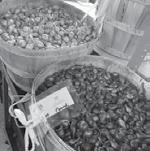HOME & GARDEN










Whenchoosing plants for flower beds this year, consider going native.
The U.S. Department of Agriculture promotes planting with native species, noting that native plants are adapted to the local climate and soil conditions where they naturally occur. They provide nectar, pollen, and seeds that serve as food for native butterflies, insects, birds and other animals.

Native plants do not require fertilizers and require fewer pesticides than lawns, the USDA website says. They also require less water than lawns, help prevent erosion and provide shelter and food for wildlife.
Homegrown National Park, a nationwide, grassroots organization, promotes landscaping with native plants to benefit pollinators and other wildlife. Proponents of native planting urge gardeners to reduce the size of lawns, eliminate invasive plants, plant native plants and reduce the use of fertilizer. The movement made its way to Delaware County in 2021, when a group of residents started the program in Delhi.
“With 5,000 residents, we felt it was a great place to start,” organizer Kathy Mario said. “Given that younger people have moved into Delhi and they get the climate science and what can be done to help, we felt it was a good place to start this program.”
Representatives from Cornell Cooperative Extension of Delaware County and the Delaware Otsego Audubon Society were among the volunteers that formed the steering committee.
During that first year, a grant allowed the group to purchase enough native perennials from The Fernery in Hartwick to give two free native plants to 200 residents.

The plants included woodland sun-
“While the other plants are pretty, they don’t give the same nutritional value to pollinators as native plants do. Years of research has shown that native plants help the native birds, bees, bats and butterflies.”
 Kathy Mario
Kathy Mario
flower, wild bergamot, beebalm, swamp milkweed, smooth aster, yarrow and purple Joe Pye weed. Those who signed up to get the free plants were given care instructions for the plants they took and were asked to post pictures to the Delhi’s Homegrown National Park’s Facebook page.
The group picked National Pollinator Week, observed each year during June, to give out the plants.
“While the other plants are pretty, they don’t give the same nutritional value to pollinators as native plants do,” Mario said. “Years of research has shown that native plants help the native birds, bees, bats and butterflies.”
In addition to planting native flowers, proponents of natural planning urge people to plant native trees, bushes and grasses to help the area’s biodiversity.
More information and resources for joining the native planting movement can be found at https:// homegrownnationalpark.org/

Each year, gardening enthusiasts anxiously await the arrival of spring. Spring is a great season to plant new flowers, plants, grasses, and trees, making it a popular time of year to spend sunny days out in the yard.

Veteran gardeners may know their landscapes well and be able to pick the right plants on their own. Novices may need a little help as they look to give their landscapes a whole new look. The following are some helpful tips to help homeowners pick the right plants for their landscapes.


• Conduct a site evaluation. A colorful landscape featuring an array of plants and flowers can be eye-catching and add curb appeal to a property. However, where plants will be planted is a significant variable that must be considered before homeowners choose what to plant. The Center for Agriculture, Food, and the Environment at the University of Massachusetts Amherst notes that site evaluation is the first step when picking plants. A number of factors must be evaluated, including light availability; water availability; exposure to the elements, including wind and extreme temperatures; and competition from existing vegetation, among other things. Document these variables prior to picking plants. For example, take note of the area you plan to plant to see if it is full sun or partial shade, and then pick plants whose growing conditions align with those you observe.
• Look at more than looks. Aesthetic appeal might be what homeowners most desire from their landscapes, but that appeal is only achieved when the right plants are chosen for a space. If the wrong plants are chosen, they’re unlikely to thrive or they could threaten existing vegetation, thus compromising the overall appeal of the property. Native plants can often handle local weather conditions, so prioritize natives over more exotic plants whose key attribute is aesthetic appeal. If jaw-dropping aesthetic appeal is your top priority, speak with a local landscaping professional about which natives can provide that without compromising surrounding vegetation.
• Consider maintenance prior to planting. Maintenance is another variable gardeners must consider. Newly planted trees may require substantial watering until they’ve fully established their roots, and some homeowners may not have time for that. In addition, certain plants may require a considerable amount of pruning in order to create and maintain the look homeowners desire. Individuals must be willing to invest the time and effort necessary to maintain new plantings that require such diligence. If not, look for plants that don’t require much maintenance while keeping in mind that even low-maintenance plants still require some effort and attention.
• Consider local wildlife. If your lawn is routinely visited by local wildlife, then look for plants that won’t look like a meal to these welcome, if uninvited, guests. For example, if you routinely see deer lounging around in your backyard, look for deer-resistant plants. This is a good way to protect your investment, of both time and money, and ensure minimal wildlife traffic through your newly landscaped yard.
Spring gardens are awe-inspiring, especially when homeowners embrace various strategies for successful planting.
Are you renovating your home or building a new abode? When it comes to flooring, keep in mind the undeniable advantages of vinyl.

Multiple qualities
This versatile material has been gaining popularity in the world of interior design. Modern vinyl flooring has the following benefits.
• It’s cost-effective compared to other floor coverings

• It’s easy to maintain
• It’s scratch- and scuff-resistant, making it suitable for high-traffic areas
• It’s waterproof, making it practical for bathrooms and kitchens
• It can be made to look like natural stone and wood

• It’s warmer underfoot than other types of flooring materials like tile
• It’s available in several formats, including rolls, tiles and strips
Visit a flooring retailer near you to discover the versatility of vinyl flooring.

Are your kitchen cabinets 20 or 30 years old? Are they showing signs of deterioration? Replacing them is a significant project that requires careful planning. Here are a few things to consider for the best results.
Consult an interior designer to help you choose new cabinets that complement your home. They’ll create mock-ups using 3D design software to show you various cabinets that fit your space, style and budget.
Cabinet materials include medium density fiberboard (MDF), hardwood, melamine and acrylic. Each has its advantages and disadvantages. Browse several samples to find your preference. On top of how the material looks, consider how easy it is to clean and maintain.
Once you know which cabinets you want to buy, place your order and determine when you can have them ins-
talled, whether you’re hiring a professional or doing it yourself.
Remove the old cabinets
First, empty your old cabinets and remove them from the walls. To avoid injuring yourself, entrust this task to a professional. They’ll also dispose of unusable materials correctly.
Install the new cabinets
Before installing your new kitchen cabinets, prepare the room. For example, clear and protect the floor, remove your appliances and disconnect the plumbing. Depending on the project’s complexity, you may need to find an alternative space to prepare your meals. Replacing the cabinets is a sure way to make your kitchen look great and increase the value of your home. Visit your local kitchen design store for more ideas.
that improve a home’s energy efficiency are primed to surge in 2023, according to U.S. News & World Report.
The magazine cites two reasons for the trend — the home improvements reduce energy and utility bills, and the federal Inflation Reduction Act offers tax credits and other incentives for energy-saving improvements.

Popular improvements include things as simple as better insulation, better windows or smart thermostats, and as big and complex as solar panels and heat pump systems.

The U.S. Department of Energy says heat pumps “offer an energy-efficient alternative to furnaces and air conditioners for all climates.” Like a refrigerator, heat pumps use electricity to transfer heat from a cool space to a warm space, making the cool space cooler and the warm space warmer. Because they transfer heat rather than generate heat, heat pumps can efficiently provide comfortable temperatures for a home.
Ducted heat pump systems can be air-to-air, water source or geothermal. They collect heat from the air, water or ground outside a home and concentrate it for use inside.
For homes without ducts, air-source heat pumps are also available in a ductless version called a mini-split heat pump. In addition, a special type of air-source heat pump called a “reverse cycle chiller” generates hot and cold water rather than air, allowing it to be used with radiant floor heating systems in heating mode.
The U.S. Department of Energy website says the agency is researching ways to make heat pumps more affordable and efficient. DOE launched the Residential Cold Climate Heat Pump Technology Challenge in 2001 to accelerate deployment of cold climate heat pump technologies.

Increasingly, plumbing, heating and air conditioning companies are offering heat pump installations.





New York state offers financial incentives for heat pump installation. For more information, visit https://tinyurl.com/2p89y233


Do you want to paint (or repaint) a room, staircase or piece of furniture? Here are six things to remember to ensure your painting project is successful.
1. Choose high-quality products. For the best results, invest in high-quality products. For example, spend the extra money on good paint, brushes and rollers.





2. Select the right color and finish. Compare several samples to select a paint color you love. Make sure to choose the right finish for your desired look.
3. Think about maintenance. Kitchens, bathrooms and entryways are more likely to collect dirt and dust. Therefore, choose a finish that’s easy to clean and can withstand heavy traffic.
4. Consider the surface type. When choosing the right paint for your project, it’s essential to consider the surface type. For instance, concrete, wood and metal require different types of paint and surface preparation.
5. Evaluate your experience level. If you’ve done several painting projects in








the past, you may have enough experience to take on the task yourself. If not, call a professional for beautiful, smudge-free results.

6. Buy enough paint. Depending on your project, you may need to apply a primer and account for one, two or even three coats of paint. Ensure you buy the correct amount of paint, especially if it’s a custom blend. Visit your local paint retailer for personalized advice.


Washing painted walls can be tricky and requires special care. Follow these steps to avoid marring the paint or leaving unsightly scuffs.
1. Gently remove dust and cobwebs with a vacuum cleaner or duster.
2. Place old towels along the baseboards to absorb excess water.
3. Wash the walls with a sponge or mop, working from top to bottom. Gently scrub away stains as needed. Water alone is usually sufficient for surface dirt, but you may need to use a mild detergent for stubborn stains.

4. Dry the cleaned and rinsed surfaces with a fresh cloth as you go. Psst! The darker the paint color and the more matte the finish, the less scrubbing you should do.
Do you have high walls that are nearly impossible to reach? Use a telescopic mop or hire a professional cleaner.
Perennial herbs are easy to grow, enhance your cooking and return year after year with little effort. Here are four hardy herbs to try growing.
1. Chives have a mild onion flavor, similar to leeks, which enhances the taste of soups, dips and baked potatoes. Beyond extra watering in sweltering weather, chives need almost no attention.
2. Oregano is a Mediterranean musthave. Its mellow, earthy flavor goes well with various dishes, including pizza, pasta and vinaigrettes. Oregano happily grows in the ground or a container.
3. Thyme is a grassy herb with floral notes. It holds its flavor in cooking, pairing well with ingredients like garlic, olive oil and tomatoes. Thyme is relatively drought-tolerant and trouble-free once established.
4. Mint is a tenacious herb with a robust, refreshing flavor that complements lamb dishes, peas and cocktails. Mint can be invasive, but you can contain the spread by growing it in pots.

Pick up everything you need to start your perennial herb garden at your local plant nursery.


Looking for showy, brightly colored flowers to give your flowerbeds new life this summer? Look no further than these five easy-to-grow annuals.
1. Wax begonias do well in various conditions and don’t need much to thrive. They bloom from late spring through late fall.

Gardening can seem intimidating for first-timers. Here are a handful of vegetables you can easily grow without much experience.
1. Carrots are hardy and grow well in cool conditions. They can be harvested in late July for baby carrots or after the first frost for large, sweet-tasting ones. Orange varieties are the most reliable growers.
2. Lettuce tolerates shade better than other vegetables and grows fast. You can enjoy a weekly harvest all summer long when sown in succession. There are also plenty of varieties, including romaine, iceberg, butterhead and Batavia.
3. Radishes grow fast and tolerate cool weather. These low-maintenance plants can be grown in small gardens and make great gap fillers. As a bonus, their strong odor tends to deter pests.

4. Bush beans germinate quickly and aren’t susceptible to many diseases. Moreover, a small patch of bush beans can yield an impressive amount of produce — up to one pound per plant! Bush beans also return nitrogen to the soil to keep your garden healthy.
Pick up the seeds you need at your local nursery or garden center.
2. Canna lilies are tropical-looking annuals. These low-maintenance beauties come in a wide range of sizes — from dwarf varieties to ones that grow up to eight feet tall.
3. Zinnias come in various striking shades. They take about four to seven days to germinate and 50 to 55 days to bloom.

4. Cleomes, also called spider flowers, are fast-growing annuals. These stunners grow six feet tall and are great as a backdrop in borders.
5. Rudbeckia, commonly referred to as black-eyed Susans, are bright-yellow daisy-like flowers that provide a pop of color in late summer.
Visit your local garden store to purchase seeds and get started.
Blooming tulips are a telltale sign that spring has sprung! Although it can be tempting to cut the entire plant back once the blooms fade, it can affect the following year’s performance.
Tulips use their stems and foliage to gather energy for the bulb as they die off. Cutting them back too early robs the bulb of the energy it needs for the next growing season.
Instead, once the blooms wilt, clip off only the flower head. It keeps the tulip from creating a seed head but allows the greenery to remain. After a week or two, the remaining foliage will die back and slowly turn brown. This is a sign that it’s safe to cut the tulip down to the ground.
Allowing your tulips to wither slowly goes a long way to keeping them healthy and robust for the following spring.






Dogs, particularly puppies, can be full of boundless energy. Channeling that energy into exercise with long walks or play sessions can help stem dogs’ propensity to get into trouble around the house as they burn off extra adrenaline. Pets who don’t have an energy outlet may chew off-limits objects or get into other mischief.
According to the American Kennel Club, the amount of exercise a dog needs depends on the animal’s age and breed. For example, border collies or Siberian huskies may require much more exercise than English bulldogs, simply because the former are working breeds. Pet owners with large backyards often find those outdoor spots are ideal for when their dogs get the “zoomies,” something that tends to be a daily occurrence. Letting their dogs run around yards, whether on their own or chasing tossed tennis balls, is an ideal way to provide exercise and tire out pups. In such scenarios, it’s vital that pups have a dog-friendly yard in which to play.
An expanse of grass is the perfect place to frolic or enjoy some sunbathing – for people or pets. But contact with chemically treated lawns can cause a number of health issues for dogs, such as allergies or intestinal upset.
Switching to native grasses can reduce the need to use chemicals to get lush lawns. When supplementation is needed, homeowners can switch to organic products or natural compost as safer alternatives than chemical-based products.

Off-leash running and bounding through the yard will make any dog smile. However, a fence is a must-have to ensure a dog doesn’t become an escape artist. Be sure the fence is high enough so that the pup cannot jump over it. Burying chicken wire in the dirt beneath the lower edge of the fence also can help prevent dogs who like to dig from exiting by crawling underneath the fence.
Consider installing a lock on the fence gate so that no one can wander in and surprise the dog, which may startle the animal and prompt it to defend the property. A lock also helps prevent dog theft.
Keep the yard tidy
Maintaining a clean yard also is key to safety. Inspect the yard regularly to make sure nothing is around that can prove harmful, whether it’s poison ivy, felled branches or broken fence panels. Also, keep shrubs and grass trimmed to reduce flea and tick populations on the property.
Avoid poisonous plants
Certain plants can be dangerous if they’re consumed by curious pups. Chrysanthemums, peonies, irises, and hydrangeas are some plants that can be poisonous. For a full list of poisonous plants, visit the ASPCA website (aspca.org).
Keep an eye on animals
Dogs can spend some unattended time in the yard, but
Spring is a season of rejuvenation, and perhaps nowhere is that rebirth more noticeable than in the yard. Each spring, grass begins to grow again as inviting landscapes beckon people outdoors.
Extra sunlight and rising temperatures make spring a great time to plant flowers, grasses and trees. To ensure successful planting, homeowners must take steps to prepare the soil. Healthy soil can provide the ideal conditions for roots to take hold, helping plants establish themselves before potentially harsh summer conditions arrive. Preparing soil might seem like an extensive job, but a simple approach may be all that’s necessary to create conditions that promote plant growth this spring.
• Clean up the previous months’ mess. Whether homeowners live in regions marked by year-round warmth or places where winter typically features heavy snowfall, it’s a good idea to clean up an area prior to
check in from time to time. Should wildlife get into the yard, dogs may get hurt by tussles or bites. Birds of prey, such as owls, hawks and even vultures, may attack small dogs in a yard. According to Pat Silvosky, director of the Milford Nature Center in Kansas, some birds can be territorial. While they might not view a dog as an easy meal, they could swoop down and attack to defend territory. The same may occur with other wild animals. A dog-friendly yard may require a little effort to create, but it’s worth a little sweat equity to keep pups safe.
spring planting. Fallen leaves, rocks, grass clippings, and other debris can contribute to compacted soil that makes it hard for plants to establish strong, healthy root systems. Clear away any debris prior to planting before taking the next step in your soil preparation routine.
• Loosen the soil. Once debris has been cleared away, loosen the soil. Depending on the size of the area where you’ll be planting, you may need to invest in tools like a shovel, spade, spading fork, and/or a lawn edger. If you’re planting in a small area, such as a deck planter box that still has soil from last year’s planting inside it, you can either clean the box and replace the soil entirely or dig around with a handheld trowel, cultivator and/ or weeder. It’s important to loosen all of the soil around where you will ultimately plant prior to planting to ensure water can reach the roots and help them establish themselves once planting is completed.
• Test and, if necessary, amend the soil. A simple pH test can help determine the acidity or alkalinity of the soil. This is an important step as soil that is too acidic or alkaline can decrease the availability of nutrients the plants will need to thrive. In addition to conducting a pH test, which can be purchased at little cost at a local home improvement store, homeowners can contact their local Cooperative Extension Service to test their soil quality. These tests will reveal soil pH, but also can shed light on the texture of the soil and other components. Once the test is conducted, the local Coop Extension Service may recommend amendments to improve the nutritional quality of the soil so new plants can thrive.
Soil conditions go a long way toward determining if new plants will thrive. Preparing the soil prior to spring planting can ensure a successful season.

Exterior renovations consistently top the list of projects that offer maximum return on investment, according to Remodeling magazine’s annual “Cost vs. Value Report.”Siding replacement is a popular exterior renovation and one that can completely transform the look of a home.
Siding comes in a variety of materials, and homeowners can explore the pros, cons and affordability of each to make the most informed decision when replacing their existing siding. Factors to consider apart from price include durability, maintenance and aesthetics.
Vinyl
Vinyl siding is one the most popular siding materials in North America. That popularity is perhaps due to the relatively low cost of vinyl siding replacement, which Forbes Home estimates is between $6,150 and $15,900 to install for a 2,000-square-foot home. A wide array of color options as well as weatherproof protection makes vinyl siding worthy of consideration.
PVC, which is what vinyl siding is comprised of, also is quite fire-resistant. Potential pitfalls of vinyl are that it can fade more quickly than other siding materials and is sensitive to excess UV exposure.

Engineered
Engineered materials cost more than vinyl but are considered very durable. They can be advantageous in damp climates or ones where insects are problematic. LP SmartSide® is a type of engineered hardwood that is very durable, so much so that a 50-year warranty often is offered for the product, according to First American Roofing & Siding. This material can be painted if homeowners desire a change of color down the line. This siding costs around $2.50 to $4.50 per square foot for siding and all trim accessories with an additional installation cost of $5.50 to $12.00 per square foot. The product is made of wooden strands that have been coated with wax for moisture resistance. A special zinc-based solution is added to protect against rot and insect infestation.
A similar product, HardiePlank®, is engineered from a blend of cement, wood fibers, fine sand, and water. It is similar in price point to the SmartSide and offers resistance to rot and insects. HardiePlank also can be repainted.
Engineered products can be more expensive to install and generally are not DIY renovations, which may deter homeowners working on tight budgets.
Wood siding
Wood is one of the oldest siding materials. It can be stained or painted and comes in a variety of styles, from boards to shingles. It’s a popular choice in historical homes or ones with classic, architectural details.
It’s important to note that wood is a combustible material that can be susceptible to water and insect damage. It also needs to be maintained continuously to look its best. This makes wood siding a true commitment on the
part of homeowners. The cost is midrange between vinyl and engineered sidings.
Metal
Those interested in one of the most energy efficient options in siding can look no further than metal siding. Metal isn’t just for roofing. According to Colonial Contracting, Inc., metal siding creates a uniquely modern appearance and comes in a variety of styles that complement homes.
Unlike fiber, wood or vinyl products, metal siding reflects
the sun’s rays and keeps interior temperatures cooler in the summer, a boon in hot climates but maybe not the most insulating option for cold climates. One potential pitfall is the possibility of rust, which would make metal siding a less ideal choice for those who live near the ocean. The cost of metal siding is comparable to other siding products, at around $10 per square foot. These are a few of the siding options homeowners can investigate if they’re revamping the exteriors of their homes.
Vinyl siding is not something that many homeowners may consider painting, but it can be done. However, some contractors may not recommend it as the best option to overhaul a home. Painting siding means it will only be as durable as the paint used. It’s also essential to determine if painting vinyl will void any warranties. Wood or engineered wood or fiber cement siding tend to be better options than vinyl should you want to switch colors down the line. But vinyl siding can be painted if it is done right, and it can be an affordable way to change the look of a home without investing in new siding. According to Benjamin Moore Paints, vinyl siding that will be painted will need to be cleaned thoroughly, including the removal of any mildew, chalk or dirt, to enhance paint adhesion. Pitted or porous vinyl siding always must be primed, but others may not require priming. Choose an exterior paint designed for painting on vinyl. Benjamin Moore has a palette called Colors for Vinyl that can be used in select exterior paint lines. Two coats of paint are recommended. According to BobVila.com, paint for vinyl has acrylic and urethane resins that accommodate the expansion and contraction of vinyl and help the paint stick. Also, for the best results, the home improvement experts on the site advise painting when temperatures are mild and there is low relative humidity and an overcast sky.
Are you considering renovations but reluctant to risk supply chain delays? A successful remodel isn’t out of the question if you take a proactive strategy. Here are some tips to keep your reno budget — and patience — under control.

Phased approach. Divide your project into a series of mini projects. You’ll get a sense of satisfaction from small gains and keep the reno mess under control.

Flexible timeline. Plan your project timeline before you start. First, identify stages that depend on the arrival of crucial materials and supplies. Then, build extra time into those stages to give yourself a buffer.
Temporary storage. Clear away space on your property or rent a storage unit. This will give you a place to keep materials while you wait for the rest to arrive.


Contingency budget. Build extra room in your budget for the unexpected. With transport costs in flux, you may suddenly find that materials prices have increased. You may also need to factor in added labor costs.



Talk to a local designer or contractor. They’ll have the inside track on building supply chains and can suggest creative substitutions and workarounds.



How to remodel successfully despite supply chain issues
Contracts provide protection for all parties signing on the dotted lines. According to LegalMatch.com, a contract is an agreement between two parties that creates a mutual legal obligation. Oral contracts are possible, but written contracts are preferred for a number of reasons.

Any time a person sets out to do a home improvement project that involves the use of contractors and other professionals, he or she should have a contract drawn up. A contract can ensure that the work will get done safely, within a given time frame and according to specifications. A contract should contain certain details.
1. A defined scope of work: Here is where the scope of the job should be spelled out in detail. This portion should include the materials being used, what the homeowner has requested, special details, and who will take care of each facet of the job. For example, if the home-
owner will be providing the materials, it should be noted here.
2. Procedure for changes: To be comprehensive, renovation contracts should note the process that will be followed for any alterations or additions to the project.
3. Floor plans: In some instances, the
contract will include floor plans, architectural drawings and other details.
4. Indemnity clause: The contract should include a clause that indemnifies the property owner against legal liability should any damages or injuries take place on the property.
5. Work schedule: The contract also should include a work schedule that identifies the requested start time and estimated end time for the project. Parties should understand that inclement weather or other delays could affect the schedule.
6. Cost: The contract should reference the agreed upon bid price, highlighting the agreements for procedures if additional materials are needed or if the job runs long
7. Warranty: If a warranty is being offered, the details should be included in the contract. Homeowners should expect a reasonable one-year warranty to cover any defects in the contractor’s work.
Renovation contracts are essential any time there is an agreement between homeowner and contractor. Good contracts will include various components.

Home improvement trends come and go, and one trend that has become wildly popular in recent years is recognizable in yards every night. Landscape lighting has transformed how people see and enjoy their properties at night, making it one of the more sought-after upgrades among modern homeowners.
Curb appeal is often seen through the lens of how homes appear during daylight hours, but landscape lighting can make homes look better and more modern, and potentially safer, after the sun goes down. With such potential, landscape lighting is worth exploring for homeowners looking to upgrade their properties.
When considering landscape lighting, homeowners should know that there are various options to consider. According to the lighting experts at Lumens, spotlights project a concentrated and narrow beam of light that’s usually around 45 degrees. Spotlights are often chosen to highlight specific features on a property, like a component of the landscaping. Individuals who want to cast light over wider, more general areas may consider floodlights, which Lumens notes spread light up to 120 degrees.
Inground lighting is among the more sophisticated landscape lighting options. Lumens notes that inground lighting illuminates the whole of a tree or structure, often creating a dramatic look. These circle-shaped lights also are great at illuminating walkways and driveways.
Post lights are another outdoor lighting option, and these are often used to light up long walkways and pathways so it’s easier and safer to navigate dark areas at night. Is landscape


Many homeowners consider a do-it-yourself approach when pondering a potential home renovation, and a landscape lighting project is likely to inspire such curiosity as well. The home experts at HGTV note that the feasibility of DIY in regard to a landscape lighting project depends on the type of lighting homeowners want to install and where they want to install it. Replacing an existing electrical fixture may be well within the skill of a seasoned DIYer, but installing a new fixture is a job best left to the professionals. Homeowners whose homes currently have no or very little landscape lighting are almost certainly better off working with a professional. Solar lighting that does not require any electrical work can be installed quickly and easily by anyone, but such options may not provide the look homeowners are aiming for. How much lighting is necessary?

The amount of lighting homeowners want to install is up to them. If the home currently has little or no landscape lighting, a consultation with a professional can help to determine how much lighting to install and where to install it. When discussing landscape lighting, homeowners may want to inquire about dimmers. Dimmers can increase or decrease lighting depending on the situation. For example, homeowners may want a little extra light during a party, but less when relaxing alone outside at night. Dimmers allow homeowners to adjust as necessary.
Landscape lighting is a popular home renovation trend. Homeowners considering adding landscape lighting to their property are urged to work with a skilled professional to devise and install a set-up that makes their homes more appealing at night.
Home renovations can improve a home in many different ways. Modifications to kitchens and bathrooms have long been popular projects, but are they the most popular renovations? According to data from Realm, which analyzed the top 10 most popular projects from roughly 2.8 million listings and permit filings in the United States in 2022, certain projects are more popular than others. Nationally, the most common home renovations include interior painting, exterior painting, finishing a basement, installing or replacing windows, and bathroom remodeling. Houzz polls have unveiled that renovating kitchens and bathrooms, new windows and porches, balcony and deck projects are among the most popular.
Do you have a tiling project in mind?
Here’s how to choose a suitable grout and correctly apply it. Choose a grout
Sanded grout is most suitable for installations with grout lines wider than an eighth of an inch. This type of grout is resistant to cracking and shrinkage. However, don’t use it if you’re laying tiles with a glossy finish, as it could scratch them.
On the other hand, grout without sand is best for narrow grout lines down to a sixteenth of an inch. It’s also easy to apply to vertical surfaces. If you’re tiling a bathroom or kitchen, use a waterproof grout.
Moreover, some grouts are cement-based while others aren’t. Cementitious grouts come in powder form, and you must mix them with water. However, epoxy grouts, for example, come ready to use
First, protect the area around your tiling project. For example, cover walls and countertops with plastic sheeting. Then, clean the area to prevent dust and dirt from sticking to the grout.

If you’re using cementitious grout, start by mixing it. Next, wet the tiles and apply the grout from the bottom up in small sections. Tilt the applicator to distribute the grout evenly and fill in the joints.
Remove excess grout and wait about 20 minutes before cleaning the tiles and smoothing the grout with a damp sponge. Scrub as little as possible and rinse your sponge regularly. Wipe down the tile one last time once the grout has thoroughly dried. Then, apply a sealant. Find all the materials you need to complete your project at your local home improvement store. If you want flawless results, hire a professional tiler.

Does the smell of pizza cooking make your mouth water? You may be interested in an outdoor pizza oven if you enjoy using your barbecue all four seasons. Here’s a closer look at this popular cooking appliance.
Available in various sizes, pizza ovens are typically fueled by wood or propane. You can also purchase hybrid models that use both. You can expect to pay anywhere from $300 to $5,000 for a portable or stationary pizza oven. They come in sturdy and attractive materials like stainless steel, copper, stone and more.
Most people dream about creating a welcoming, tidy and attractive home. However, creating a magazine-worthy space can be pricey. Fortunately, there are several inexpensive ways to make a stylish residence. Here are four smart ideas.

1. Display your fashion accessories
Use nails, hooks, shelves or pegboard to artistically display your most beautiful, eccentric or elegant accessories like hats, evening bags, stilettos, watches and ties.
2. Create a bold accent wall
Transform the end of a hallway or large wall into a statement piece. For example, you can use a contrasting paint color or apply a uniquely patterned wallpaper. Using recycled paint or liquidation wallpaper is even better.
Walking into a room full of plants instantly makes you feel good. Fortunately, you can find beautiful, affordable and easy-to-care-for plants at local stores. If your friends have green thumbs, ask them for a few cuttings.
4. Choose used accessories
With some research, you can find oneof-a-kind decor in classified ads, thrift stores, second-hand stores and garage sales. For example, you can pick up mirrors, knick-knacks, frames, lamps and vases in good condition at ridiculously low prices.
With a bit of imagination and resourcefulness, decorating your home can be affordable and fun.
Pizza ovens are designed for outdoor use. However, protecting yours from ice, snow and sleet is essential. If you have a portable model, store it in an enclosed space like a shed. If you have a stationary oven or one that’s very heavy, cover it with a durable waterproof cover. Additionally, promptly remove fallen snow with a brush or broom.
Visit your local kitchen supply store to find a pizza oven to delight your family.
4 smart ideas for decorating your home on a budget



Renovations are a great way for homeowners to reshape their homes. Some may aspire to renovate so their home is more reflective of their personal taste, while others may do so in an effort to make their homes better align with modern styles and sensibilities. Regardless of why a homeowner chooses to renovate, the need to do so is often evident to the naked eye, especially when the time comes to update home exteriors.
Curb appeal is often discussed in regard to the effects it can have when selling a home. But curb appeal is equally important for homeowners who aren’t putting their homes on the market. A well-maintained, aesthetically appealing home is a source of pride, while a home with fading curb appeal can make homeowners feel a little sheepish. Homeowners who want their homes to maintain their curb appeal can look for signs that it’s time to update their home exteriors.
• Curling shingles: The roof may not be the first thing people think of when pondering curb appeal, but a damaged roof can contribute to problems that ultimately affect the exterior and interior of the home. Multiple curling shingles indicate it’s time to replace the roof. The sight of curling shingles is not pretty, but the larger issue in such instances is the potential for costly water damage when water gets in through the affected shingles.
• Dated entry door: Many home im-

provement experts insist they can determine when a home was built or most recently renovated simply by looking at the front door. Steel and glass doors are popular in modern homes, so homeowners with front doors with ornate designs and oval glass inserts can likely benefit from an upgrade to their entryway. A modern front door can make a statement and real estate experts note how popular updated front doors are among buyers.
• Unsightly landscaping: It’s not only the physical components of the home that may suggest an update is necessary. Homeowners without a green thumb may have exterior landscaping that has seen better days. If a spring or summer day spent tending to your landscaping is not your ideal weekend pastime, then consider replacing unsightly landscaping with low-maintenance plants or hardscaping. These alternatives to more needy plants can create curb appeal without requiring any extra work for homeowners.
• Cracked driveways/walkways: If the driveway looks like a busy road at the end of snow plowing season, chances are that’s adversely affecting the impression people have of your home. In addition, cracked walkways indicate a need for renovations, as these areas are front and center when welcoming guests.
Updating a home’s exterior can restore curb appeal and help homeowners feel better about their properties.




